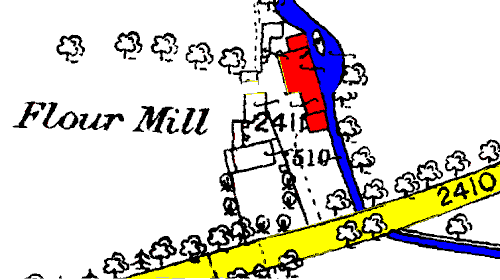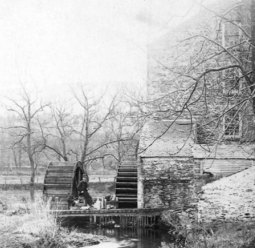DESTRUCTIVE FIRE.— PULROSE MILL BURNT DOWN.
ON Wednesday night or early on Thursday morning, a, fire broke out in Pulrose
mill, occupied by Mr Pettars [sic Petters], which completely gutted the building
and destroyed the machinery, a large stock of flour, wheat, &c, stored
therein at the time. The fire was not discovered until about five o'clock
on Thursday morning, when the crash of the falling roof and the roar of the
flames which ascended to a great height in one vast sheet of fire awoke Mr
Pettars, who found the whole country round illuminated to such an extent that
objects at a great distance could be seen distinctly. Mr Pettars at once got
onto one of his horses and came to town to seek assistance, and found that
the blaze of the fire had already been seen by a number of persons and an
alarm raised. A farmer residing at Kirk Michael, who had started home with
his cart, having had business here on the previous day, awoke the Captain
of the Fire Brigade, Mr W. Kewley, who was not long in mustering his men,
and getting out the hose reel, fire engine, and other apparatus of the Brigade.
The Chief-Constable also had all the men of the force then on duty paraded,
and proceeded with them to assist the Brigade, which arrived at Pulrose shortly
after six o'clock. In the meantime Mr Pettars, with the aid of one or two
of his men, had removed his horses and cattle to a place of safety, and Mr
Kewley, finding that the mill and its contents were so far destroyed as to
render any efforts of the Brigade futile in saving the building, devoted his
whole attention to the preservation of the malt kiln, engine-house, and outbuilding
adjoining. The mill-race afforded an unlimited supply of water, and as every
man on the ground worked with a will, by seven o'clock not only were the buildings
referred to made safe, but the fire in the mill considerably reduced. Fortunately
the wind, which blew fresh, was in a direction to carry the flames away from
the dwelling-house, stables, and shippon [cowhouse], and as soon as the fire
had been so far reduced as to lessen the intense scorching heat from the mill,
the horses and cattle were brought back and housed, the poor animals having
suffered greatly from fright. Two cows were subsequently discovered to be
very ill, and but little hope is entertained of the recovery of one of them.
The large stock of wheat and flour in the mill becoming mixed with the water
from the hose pipes was rapidly solidified by the fire, and became one mass
of unleavened bread, in which much of the machinery was embedded. During Thursday
this mass continued in a state of redheat, and had not cooled sufficiently
yesterday to admit of anyone examining the debris.
Nothing is known as to the origin of the fire. The boiler fires have not
recently been lighted, the supply of water having for some time been more
than sufficient to work the mill, yet singularly enough it is the opinion
of the captain and men of the Fire Brigade that it was at that end of the
premises that the fire first broke out. The malt kiln, where there was a fire,
is at the opposite end of the mill, which it joins, while the engine and boiler-house
is detached. The men employed in the mill report that they left no light behind
them in the premises when they went home on Wednesday night at seven o'clock,
and that they examined the bearings of the machinery, which they state were
quite cool. Nothing indeed is known of the fire except that at about five
o'clock Mr Pettars was awoke in the manner already described, and that the
glare of the flames lit up the whole country alarming many people in Douglas.
The loss sustained by the owner of the premises and machinery is estimated
at more than £1,000, and that by Mr Pettars at £600. The latter
had recently got in a large stock of wheat for grinding. Both the mill and
stock were insured in the Imperial Fire Insurance Society, of which Mr Spittall
is agent here, but not to the full extent of the loss either the owner of
the premises or Mr Pettars has sustained.
The Mill was rebuilt by December 1877 but there followed a protracted series
of law cases between the Mr Petters, the leasee, who had the mill, farm and
meadow on a long lease and the owner's agent on the Island, Mr Spittall, one
of which occupied some 16 days of court time with evidence being taken from
several millers and millwrights re the quality of the repair work. There was
also a criminal case in which Petters was charged with perjury but was aquitted
by the jury.


